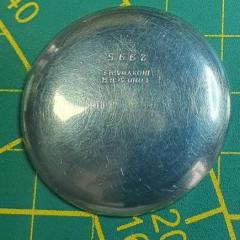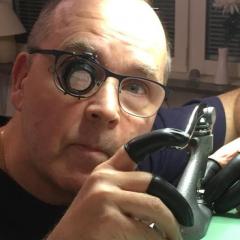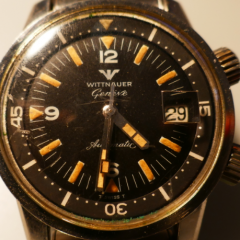-
Similar Content
-
Recently Browsing
- No registered users viewing this page.
-
Topics
-
Posts
-
Thanks for this post MikePilk, I just came across a similar problem with an Omega 1022. The problem I had was the seconds pinion spring was bent out of shape and did not even engage with the wheel properly, so the seconds hand was not moving at all. (no power loss though :) I removed the automatic module so I could access the spring and work on it. Once I bent it back close to the right shape, I experienced the same problem you reported about power loss. Many tweaks later, and the seconds hand is moving properly again, with amplitude back to good numbers again. Cheers
-
After cleaning up the pivots, I made bushes on the lathe. At this point I've pressed in 6 bushes (3 sets) and the wheels turn smooth. What I can also tell you, is that I'm not looking forward to final assembly. Getting the pivots aligned seems to get exponentially more difficult with each wheel that is added.
-
Islands are interesting places to live depending upon their size and other factors. This is a bigger island and it has a bridge to get there at least on one end. It's also big enough that you don't have to go someplace else to get things typically. It can be a problem if you get a job in Seattle though. Yes I've known of people who commuted from the island to Seattle for a job and I don't quite remember how many hours it took but it took a long time. So basically islands are nice if you don't have to leave very often.
-
Thanks @JohnR725! Everything you say makes a lot of sense and is encouraging to read.
-
isn't it nice to have a decent case open or when the case doesn't want to be opened? In the case of a Rolex watch that supposed to pass specific water resistant testing you probably do need to tighten the back down. But they shouldn't be tightened so much that they risk stripping the threads out. Then the other problem that comes up is the gaskets can start to disintegrate and then getting the back off can be quite a challenge unless you have a really good tool and perhaps some penetrating oil to loosen things up. Yes really nice case marking. When I was in school we were taught to mark the cases and the American watch and clockmakers Institute even had a? So if you joined at one time they would give you an identification number. They were explaining or giving an example of if the watches ever found in you have a unique number they can perhaps figure out the history of the watch or identify the body it's attached to for instance not that that probably comes up that often. So you got a unique number and even made a special metal stamp that you can purchase. It wasn't a super big aggressive stamp but still it left a mark in the back of the case. Then I heard from people at work on Rolex watches they were using a felt pen indelible but later on they decided that was bad because apparently the ink could release chemicals although it seems like once it's dry that shouldn't be an issue. Then of course today was nice is you can keep computer records sealed have to mark anything at all I personally find it's best to leave no reference behind that you were even there. Especially when you have a beautiful watch that has no markings at all and now it has your scribbling all over it not good typically if there is a typical and watch repair? a lot of minor repairs you don't need to do a complete servicing. But beyond a certain point you're going to have to take apart a lot of stuff you're going to disrupt the lubrication even if it looks perfect right now and yes you might as well just go ahead the service the whole thing. also in a watch like this where a lot of things seem to be going on the complete service would be better then you'll know exactly where you stand versus dealing with unknown mysteries for prior repair.
-








Recommended Posts
Join the conversation
You can post now and register later. If you have an account, sign in now to post with your account.
Note: Your post will require moderator approval before it will be visible.